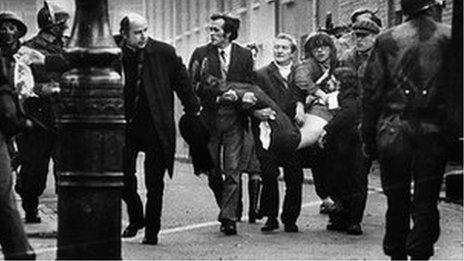Bloody Sunday: More than 100 soldiers contacted
- Published
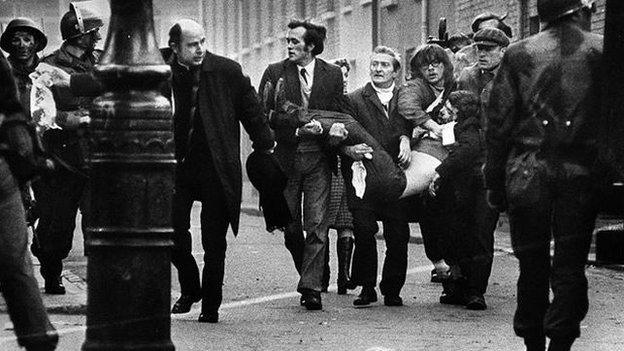
Around 10,000 people gathered in Londonderry for a civil rights march on Sunday 30 January 1972
The PSNI has contacted more than 100 soldiers as part of the investigation into Bloody Sunday.
The detective leading the enquiry said the soldiers are not obliged to speak to the police because they are being treated as witnesses and not suspects.
Thirteen civilians were killed when soldiers opened fire on a civil rights march in Londonderry in 1972.
Police resumed their investigation into the killings in January.
The information about 100 soldiers being contacted emerged on Thursday following fresh criticism of the police investigation by some Bloody Sunday families.
Det Ch Insp Ian Harrison, from the PSNI's Legacy Investigations Branch, said his team completed its "civilian witness enquiries" and made contact with more than 100 soldiers to "determine if they are willing to engage with us".
"It should be noted that these soldiers are witnesses, not suspects, and are therefore not obliged to speak with us," said Mr Harrison.
"The next stage of the investigation would be to interview those soldiers who are willing to engage with the enquiry team as witnesses."
'Road to nowhere'
Mr Harrison said his team of officers was also carrying out a number of other enquiries in relation to the investigation which he described as a "long, complex and protracted".
"I am content with the level of resources I have working on the investigation at this stage.
"If at any time further resources are required they will be made available to me."
Some Bloody Sunday families criticised the police investigation in a letter to Detective Chief Inspector Ian Harrison from Peter Madden of Madden and Finucane Solicitors.
It said that some of the families were losing faith in the investigation because they had "heard nothing from the PSNI since a meeting in January and were entirely unaware of what progress had been made".
Peter Madden also said there was a presumption that there had "still been no move by the PSNI to interview any of the soldiers involved in the shootings" and that this added to a perception that police were "reluctant to arrest and question soldiers as murder suspects".
The letter continued: "Regrettably, as we fast approach the fifth anniversary of the delivery of Lord Saville's report, it seems that little has occurred in the interim to alleviate those public concerns and those that we represent are rapidly losing faith in the PSNI's ability to see their task through."
Peter Madden demanded another meeting between the police and the families he represents.
He also asked Detective Chief Inspector Ian Harrison to set out a full written progress report within the next 14 days.
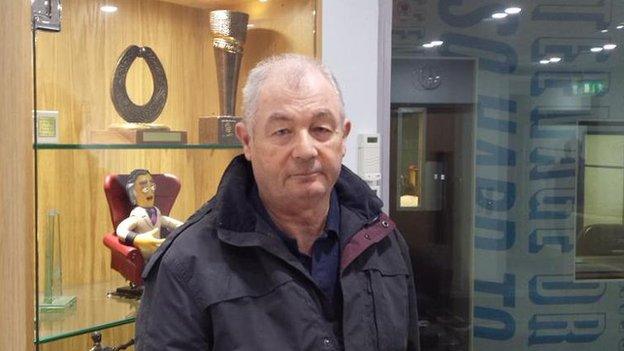
Mickey McKinney said some families feel like they are "on the road to nowhere"
Mickey McKinney, whose brother William was killed on Bloody Sunday, told BBC Radio Foyle: "The entire investigation has slowed down.
"The last meeting with the police was five months ago and we have been told nothing since then.
"There was an agreement that there would be a meeting with families every three months but that hasn't been happening.
"I only found out about the 100 soldiers being contacted last night (Thursday) but we want suspects being questioned in this case.
"Sometimes I and other families just feel we are on a road to nowhere.
"Some of the families would like to meet the PSNI immediately.
"Time is a major factor in all of this. Suspects are not getting any younger."
Clarification 9 April 2019: This article was amended to remove a reference to the death of John Johnston. This reflects the Bloody Sunday Inquiry's finding about Mr Johnston's death several months after he was wounded in Derry on 30 January 1972. The inquiry report states that his death was "not the result of any of the wounds he sustained on Bloody Sunday".
- Published23 January 2015

- Published1 January 2015
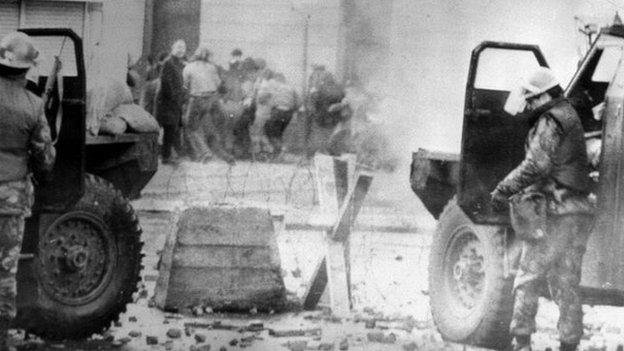
- Published11 November 2014
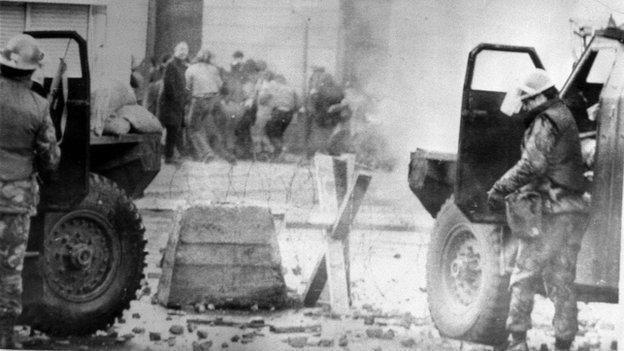
- Published3 October 2014
